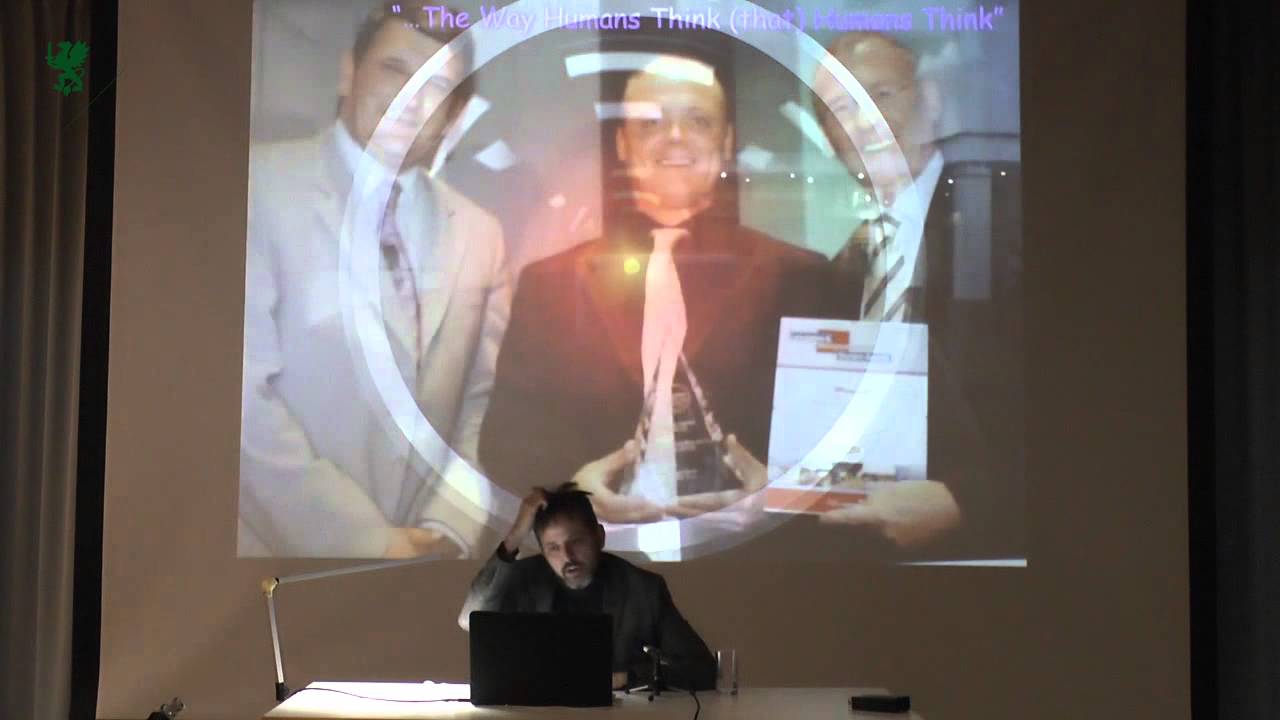http://www.egs.edu Benjamin H. Bratton, born 1968, is an American theorist, sociologist
and professor of visual arts, contemporary social and political theory, philosophy, and design.
The Post-Anthropocene: The Turing-incomplete Orchid Mantis Evolves Machine Vision.
Public open lecture for the students and faculty of the European Graduate School EGS Media
and Communication Studies department program Saas-Fee Switzerland Europe. 2015.
Benjamin H. Bratton, (b. 1968), is an American theorist, sociologist, and professor of visual arts,
contemporary social and political theory, philosophy, and design. His research deals with
computational media and infrastructure, design research management & methodologies, classical
and contemporary sociological theory, architecture and urban design issues, and the politics of
synthetic ecologies and biologies.
Bratton completed his doctoral studies in the sociology of technology at the University of
California, Santa Barbara, and was the Director of the Advanced Strategies Group at Yahoo!
before expanding his cross-disciplinary research and practice in academia. He taught in the
Department of Design/Media Art at UCLA from 2003-2008, and at the SCI Arc (Southern
California Institute of Architecture) for a decade, and continues to teach as a member of the
Visiting Faculty. While at SCI Arc, Benjamin Bratton and Hernan Diaz-Alonso co-founded the
XLAB courses, which placed students in laboratory settings where they could work directly and
comprehensively in robotics, scripting, biogenetics, genetic codification, and cellular systems.
Currently, in addition to his professorship at EGS, Bratton is an associate professor of Visual
Arts at the University of California, San Diego, where he also directs the Center for Design and
Geopolitics, partnering with the California Institute of Telecommunications and Information
Technology.
In addition to his formal positions, Benjamin H. Bratton is a regular visiting lecturer at numerous
universities and institutions including: Columbia University, Yale University, Pratt Institute,
Bartlett School of Architecture, University of Pennsylvania, University of Southern California,
University of California, Art Center College of Design, Parsons The New School for Design,
University of Michigan, Brown University, The University of Applied Arts in Vienna, Bauhaus-
University, Moscow State University, Moscow Institute for Higher Economics, and the
Architectural Association School of Architecture in London.
Bratton’s current projects focus on the political geography of cloud computing, massively-
granular universal addressing systems, and alternate models of ecological governance. In his
most recent book, The Stack: On Software and Sovereignty (MIT Press, 2015), Bratton asks the
question, “What has planetary-scale computation done to our geopolitical realities?” and in
response, offers the proposition “that smart grids, cloud computing, mobile software and smart
cities, universal addressing systems, ubiquitous computing, and other types of apparently
unrelated planetary-scale computation can be viewed as forming a coherent whole—an
accidental megastructure called The Stack that is both a computational apparatus and a new
geopolitical architecture.”
Other more recent texts include the following: Some Trace Effects of the Post-Anthropocene: On
Accelerationist Geopolitical Aesthetics, On Apps and Elementary Forms of Interfacial Life:
Object, Image, Superimposition, Deep Address, What We Do is Secrete: On Virilio, Planetarity
and Data Visualization, Geoscapes & the Google Caliphate: On Mumbai Attacks, Root the
Earth: On Peak Oil Apohenia and Suspicious Images/ Latent Interfaces (with Natalie
Jeremijenko), iPhone City, Logistics of Habitable Circulation (introduction to the 2008 edition
of Paul Virilio’s Speed and Politics). As well, recent online lectures include: 2 or 3 Things I
Know About The Stack, at Bartlett School of Architecture, University of London, and University
of Southampton;Cloud Feudalism at Proto/E/Co/Logics 002, Rovinj, Croatia; Nanoskin at
Parsons School of Design; On the Nomos of the Cloud at Berlage Institute, Rotterdam, École
Normale- Superiore, Paris, and MOCA, Los Angeles; Accidental Geopolitics at The Guardian
Summit, New York; Ambivalence and/or Utopia at University of Michigan and UC Irvine, and
Surviving the Interface at Parsons School of Design.
source

